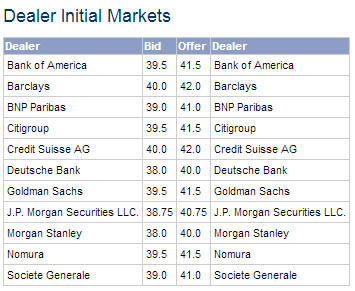It has been a while since Creditex ran a CDS settlement auction of any note for two reasons: CDS no longer is a credible or legitimate method to hedge against default risk (see Greece, Banco Espirito Santo), thus making the stated purpose of CDS irrelevant, and when the default carries with it systematic risk ISDA will simply screw over CDS-holders and change terms whenever it sees fit following a few politically-connected phone calls, at which point good luck collecting on your “insurance.” Which is why the just concluded Argentina CDS settlement auction following its bankruptcy last month, was a welcome reminder of what markets looked like in the BC (Before Central-planning) era.
The headline results were as expected: with the restructured bonds trading modestly over 40 cents, the final price on the CDS settlement was 39.5, with most dealers submitted markets between 38 on the bid side and 42 on the ask.

What was more interesting is who the biggest buyers and sellers were.
First the buyers: according to Markit, there were a total of $113 million buy physical requests, offset by $17 million in sell request, leaving a total limit order book of $96 million. Curiously, of this the vast majority was Barclays, which had just under $100 million in bond bids it needed filled. As a reminder, since the dealers intermediate end clients, it is impossible to determine if it was Barclays (i.e., its prop desk) itself that needed the collateral, or its clients. In any event, Barclays wanted it some Argentina bonds…

… and it got them courtesy entirely of JPMorgan. As the table below shows, in the reverse dutch auction, the limit orderbook was filled entirely by JPM which sold 1.9 million at 39.25 and 96.03 million at the clearing price of 39.50. In other words the entire auction was basically Barclays buying whatever bonds JPM had to sell as a result of residual non-offsetting CDS exposure.

Finally, and as always happens at these reverse dutch auctions, there is always someone who is hoping the counterparties are either idiots, or super squeezed, and will buy bonds at any price. That someone this time was Citi, which would have been delighted to sell 80 million in bonds at a price of 55, with 50 million at 99 cents! Of course, had anyone filled that offer, Citi would have made an automatic 50+ cents per bond with no risk.

